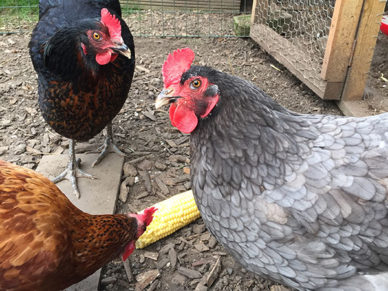Preventing egg laying problems in older hens with implants

As hens get older they have a tendency to develop problems when laying eggs. As they approach the end of lay stage shells may begin to display full or partial wrinkling. This is caused by reduced elasticity of the tubes which the eggs travel down as they form and can be compounded by the fact that egg size often increases at this time too.
If an egg stops completely and becomes embedded inside the hen this is can lead to serious problems. In this scenario the egg will eventually break inside the hen and the contents will start to ‘go off’ leading to infection which may end up causing Egg Yolk Peritonitis(EYP).
As soon as you notice that one of your hens is having problems laying eggs it may be time to consider an implant which will inhibit egg laying. Implanting your hen (the hen equivalent of the contraceptive pill) can help ensure a trouble free old age.
The implant itself is no bigger than a grain of rice and is somewhat similar to microchipping a pet dog or cat. The procedure has been around for several years now however, you may find you have to search for a vet with more experience of chickens to get the treatment administered. Once you have found someone to do it it is a straightforward and very quick procedure.
It does appear that prices across the country haven’t standardised as yet and at present there seem be a definite geographical divide with the North being generally cheaper. Best to shop around if you can find enough alternative centres in your area.
For the implant to become effective can take up to four weeks but it is likely to last for three to six months after which time the process can be repeated.
After implanting, the hen may go rather quiet for a few weeks. Her comb may fade to a pale pink and she may be less interested in food for a while. Depression and moulting have also been reported and this can cause a loss of body weight so extra high protein food (growers pellets or even chick crumb) and supplements should be offered.
Depending on how many hens you have you may prefer not to have them implanted all at the same time simply because of the after effects although, inevitably, the cost of the implant may reduce with larger numbers which could be a deciding factor.
Please bear in mind that you should not implant a hen just because she is getting older, rather wait until you see any obvious signs of a problem then take the appropriate action as soon as possible.
When the implant has become effective you are are likely to see a reduction in stress and, as well as EYP, you also reduce the risk of prolapse in to the bargain.
Poultry categories
Most recent Poultry articles
- Preventing egg laying problems in older hens with implants 15th March, 2017
- Integrating new chickens into an existing flock 15th May, 2016
- The nests in my heart – a personal view of ex-battery hens 22nd March, 2016
- Chicken FAQ: your most common chicken keeping questions answered 19th January, 2016
- Hens and herbs – no this is not a chicken recipe 08th October, 2015
- Feeding chickens: a balanced diet for backyard hens 16th April, 2015







Leave a reply